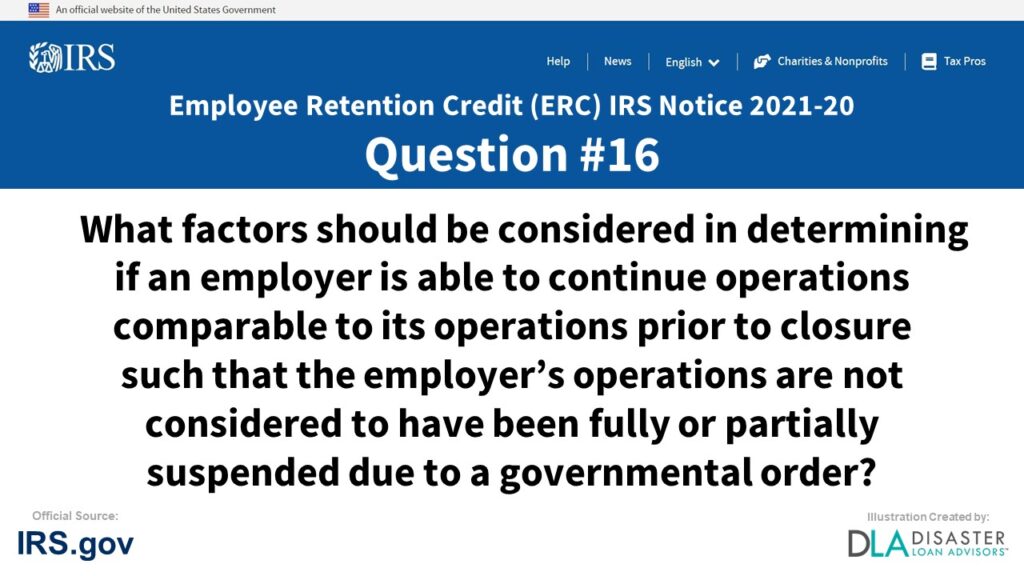
Question #16:
What factors should be considered in determining if an employer is able to continue operations comparable to its operations prior to closure such that the employer’s operations are not considered to have been fully or partially suspended due to a governmental order?
Found under the D. Full or Partial Suspension of Trade or Business Operations section of the Employee Retention Credit (ERC) IRS Notice 2021-20 with updated guidance to help business owners follow the current ERC rules.
The answer to question #16, What factors should be considered in determining if an employer is able to continue operations comparable to its operations prior to closure such that the employer’s operations are not considered to have been fully or partially suspended due to a governmental order?, can be found below.
ERC IRS Notice 2021-20 Question #16:
D. Full or Partial Suspension of Trade or Business Operations
What factors should be considered in determining if an employer is able to continue operations comparable to its operations prior to closure such that the employer’s operations are not considered to have been fully or partially suspended due to a governmental order?
The following factors should be considered in determining if an employer is able to continue comparable operations, although additional factors may be considered as well if relevant:
(1) Employer’s telework capabilities. Determine whether an employer has adequate support (IT and otherwise) such that operations can continue via work from another location.
(2) Portability of employees’ work. Determine the amount of portable work, or work otherwise adaptable to be performed from a remote location, within an employer’s trade or business operations.
(3) Need for presence in an employee’s physical work space. Evaluate the role that the employer’s physical work space plays in an employer’s trade or business (may be critical and necessary, beneficial but not necessary, or merely convenient). If the employer’s physical work space is so critical to its trade or business operations that tasks central to the trade or business’s operations are unable to be performed remotely, then this factor alone indicates that the employer is not able to continue comparable operations. Examples of workspace that are critical include laboratories or manufacturing involving special equipment or materials that cannot be accessed or operated remotely.
(4) Transitioning to telework operations. If an employer can conduct comparable operations via telework, but the employer’s operations did not previously allow for telework, or allowed for only minimal telework, then some adjustment period is expected, and, generally, the employer’s operations are not considered partially suspended during that period. However, if an employer incurs a significant delay (for example, beyond 2 weeks) in moving operations to comparable telework (for example, implementing telework policies or providing employees with equipment to telework), then the employer’s trade or business operations may be deemed subject to a partial suspension during that transition period.
For more information about the Employee Retention Credit (ERC) IRS Notice 2021-20, visit the Internal Revenue Service (IRS) Department of the Treasury, official IRS.gov tax website.
Conclusion and Summary on What factors should be considered in determining if an employer is able to continue operations comparable to its operations prior to closure such that the employer’s operations are not considered to have been fully or partially suspended due to a governmental order? – #16 ERC IRS Notice 2021-20
The answer to Question #16: “What factors should be considered in determining if an employer is able to continue operations comparable to its operations prior to closure such that the employer’s operations are not considered to have been fully or partially suspended due to a governmental order?” was answered in detail above. It was found under section “D. Full or Partial Suspension of Trade or Business Operations in IRS Notice 2021-20.
Leave a comment below if you have further questions on the Employee Retention Credit (ERC) or for clarifications on What factors should be considered in determining if an employer is able to continue operations comparable to its operations prior to closure such that the employer’s operations are not considered to have been fully or partially suspended due to a governmental order?
Employee Retention Tax Credit (ERTC): Expert Assistance to Claim Your Business ERC Credit
Up to a $26,000 ERC Refund from the IRS for Each Employee
Disaster Loan Advisors can assist your business with the complex and confusing Employee Retention Credit (ERC), Form 9416-X, and the Employee Retention Tax Credit (ERTC) program.
Depending on eligibility, business owners and companies can receive up to $26,000 per employee based on the number of W2 employees you had on the payroll in 2020 and 20216.
The ERC / ERTC Tax Credit Program is a valuable IRS tax credit you can claim. This is money you have already paid to the IRS in payroll taxes for your W2 employees.
We DO NOT charge a percentage (%) of your ERC Refund like some companies are charging. Some ERC firms out there are charging upwards of 165% to 35% of your ERC refund!
Our professional ERC fee and pricing structure is very reasonable in comparison.
If you are looking for an ERC Company that believes in providing professional ERC Services and value, in exchange for a fair, reasonable, and ethical fee for the amount of work required, Disaster Loan Advisors is a good fit for you.
Schedule Your Free Employee Retention Credit Consultation to see what amount of employee retention tax credit your company qualifies for.
Cover Image Credit: Irs.gov / IRS Notice 2021-20 / Disaster Loan Advisors.
